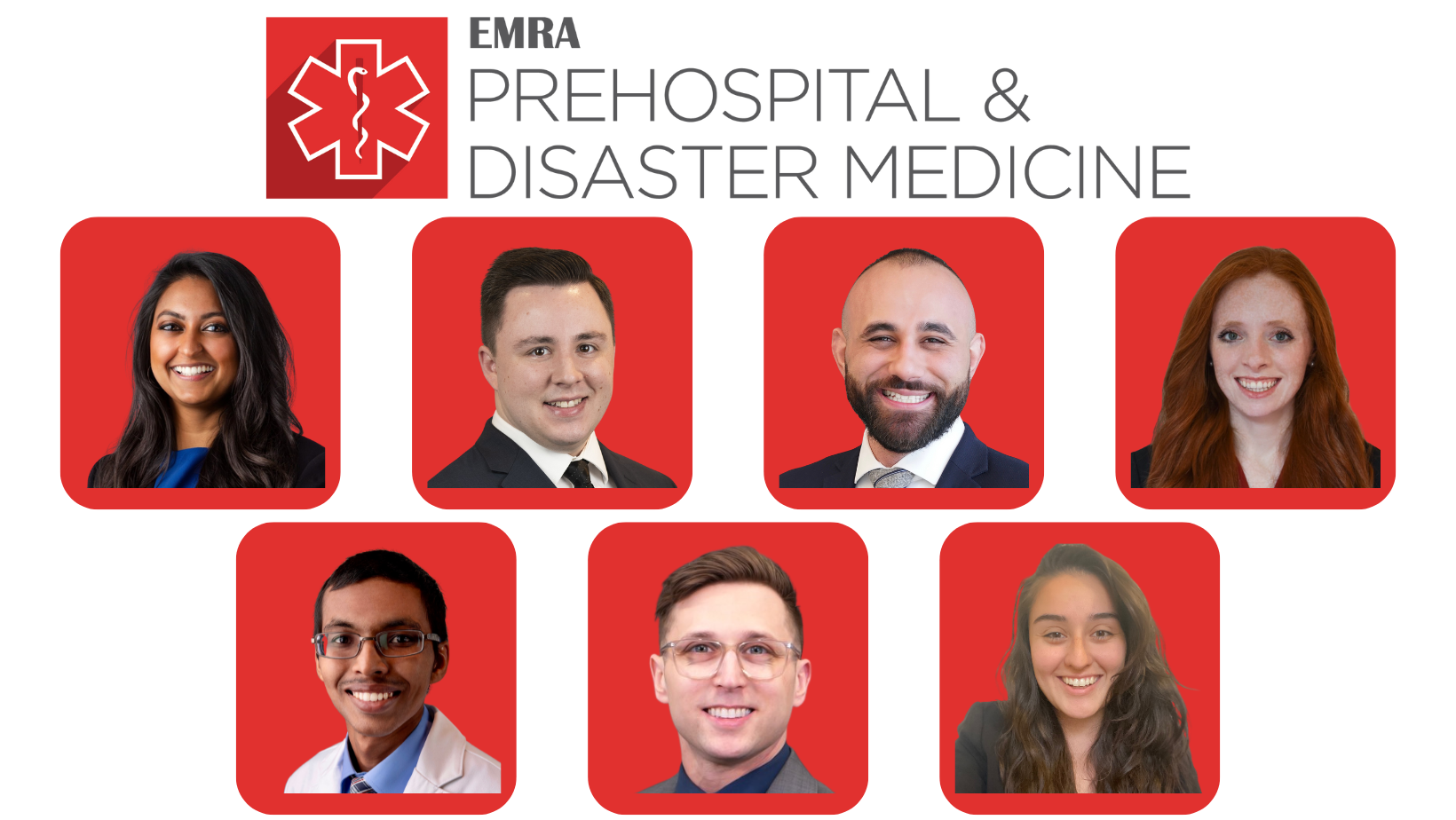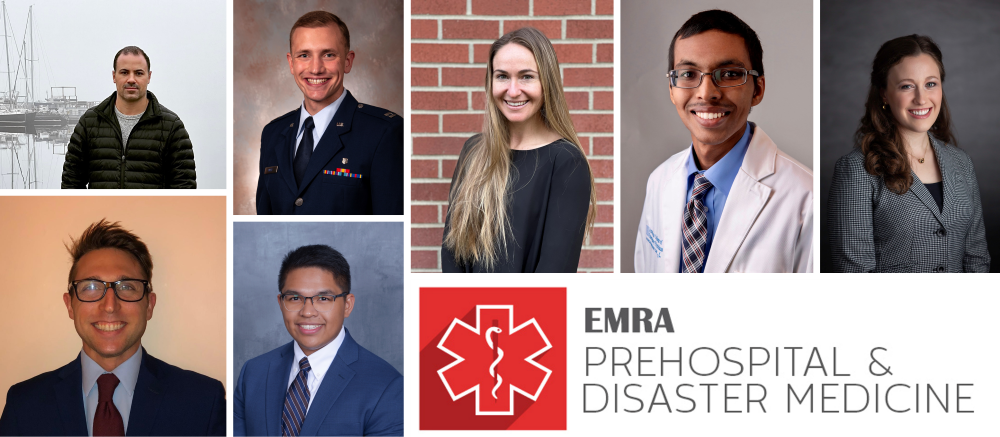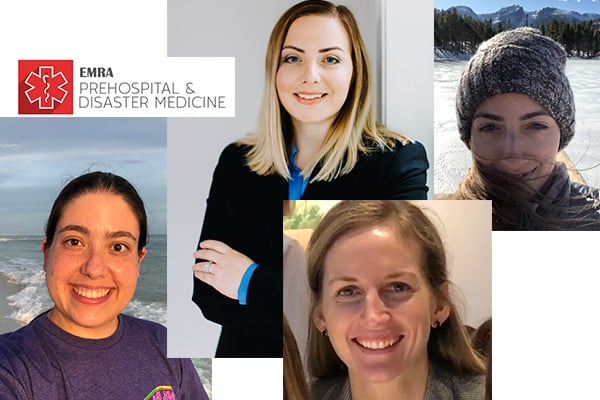2025 Prehospital & Disaster Medicine Committee Leader Spotlight

Shilpi Ganguly, MD, MS, Chair of the EMRA Prehospital & Disaster Medicine Committee, 2025
 Program: Hennepin County Medical Center
Program: Hennepin County Medical Center
Your goal as an EMRA leader: As an EMRA leader I hope to play a role in providing EMRA members opportunities for growth, development and a sense of camaraderie. The greatest gift EMRA gave me as a member was the sense of community, and as a leader I hope to continue providing that sense of safety and security for others. Emergency medicine is a dynamic field with many facets, and I hope to play a role in continuing EMRAs legacy as being the foremost resource for all who wish to enter and engage with this amazing field. As chair of the pre-hospital and disaster committee this year I look forward to being an access point and spring-board for all those interested in learning more about the exciting fields of EMS and disaster medicine.
If I weren't an emergency physician, I would be: I would work in the music industry! I worked in music all through undergrad and I loved it. Working with artists, going to different types of shows and networking within the industry was always such a treat. Every day was different, kind of like emergency medicine!
What is the last non-textbook you read? I am currently reading Iron Flame by Rebecca Yaros to prepare for Onyx Storm, which just came out. I did give into the hype.
What is your favorite hack for night shifts? The proper jams and being snuggled in the warm hospital blankets are essential for success.
Matthew Lyons, DO, Chair-Elect of the EMRA Prehospital & Disaster Medicine Committee, 2025
 Program: University of Louisville School of Medicine
Program: University of Louisville School of Medicine
Your goal as an EMRA leader: I hope to advocate for other residents and students and help them find as many opportunities to grow and network within their niche. Emergency medicine is a young specialty and has a huge growth potential, and our generation of EM physicians must be engaged to continue moving the specialty in the right direction.
Why get involved in a professional society? I originally got involved with EMRA at the beginning of my 3rd year of medical school. I was hoping to find a way to network with some current leaders in the specialty, and I ended up finding so much more. It has been amazing to meet and work with so many like-minded, motivated people and build some lifelong friendships along the way.
What is the best advice you have ever received? When considering whether or not to order that test you really don't need - "If you pick your nose in public and get a booger, you have to do something with it."
Mohammad Abuakar, M4, CCEMT-P, Vice Chair of the EMRA Prehospital & Disaster Medicine Committee, 2025
 Program: Idaho College of Osteopathic Medicine
Program: Idaho College of Osteopathic Medicine
Your goal as an EMRA leader: My goal as Vice Chair is to work with the rest of the incredible EMRA leaders to facilitate an inquisitive, collaborative, and embracing environment, where members can find support to explore their interests and share their ideas. I hope that my experiences as a critical care paramedic and municipal fire paramedic will help contribute to the advancement of prehospital and disaster medicine through the work of this committee!
Why get involved in a professional society? “There is power in unity and there is power in numbers.” - Martin Luther King Jr. History has put meaning to this quote time and time again. Professional societies, like EMRA, are full of incredibly talented and intelligent individuals, all with different backgrounds, experiences, and ideas. When forward-thinking people come together, we unleash the power that Martin Luther King Jr. described. I joined EMRA because I believe that, united together, we can find new and innovative ways to continue to advance the growing field of emergency medicine.
What is the last non-textbook you read? When Breath Becomes Air
Kyle Essex, NRP, FPC, CCPC, Vice Chair of the EMRA Prehospital & Disaster Medicine Committee, 2025
 Program: Burrell College of Osteopathic Medicine
Program: Burrell College of Osteopathic Medicine
Your goal as an EMRA leader: I want to continue to advance the field and serve as an advocate for the specialty as a whole. I have been and will continue to work to increase involvement from the ground up starting with medical students.
Sriram Venkatesan, Vice Chair of the EMRA Prehospital & Disaster Medicine Committee, 2025
 Program: Sri Ramachandra Medical College, India/University of Colorado
Program: Sri Ramachandra Medical College, India/University of Colorado
Your goal as an EMRA leader: To help our medical student and resident members of EMRA expand their understanding of Prehospital Medicine as a discipline, beyond the scope of a traditional EMS fellowship pathway, and explore the multitude of subspecialties & niche opportunities available for them to explore. As always, I also hope to facilitate connections with experts in the field through faculty lectures, panels, and interviews.
What is the best advice you've ever received? “Process is always more important than the result. The result is a by-product of the process. Worry about the controllables and take care of the small steps in life…you know, what needs to be done, what you’re supposed to do, what extra you can do, and that will automatically help you achieve your target!”
If I weren't an emergency physician, I would be: Tactical Medic
Elizabeth Mangin, Vice Chair of the EMRA Prehospital & Disaster Medicine Committee, 2025
 Program: Creighton University
Program: Creighton University
Alicia Stoebenau, MECM, NREMT-P, Assistant Vice Chair of the EMRA Prehospital & Disaster Medicine Committee, 2025
 Program: Burrell College of Osteopathic Medicine
Program: Burrell College of Osteopathic Medicine
Your goal as an EMRA leader: To build more resilient communities by promoting early exposure to disaster response systems, strengthening prehospital and incident command systems, and mentoring incoming healthcare professions.
Mr. Ballen who tells strange, dark, and mysterious stories that feed my paranoia.
Yoga with Adriene who makes great 30 day yoga challenges.
Related Content






